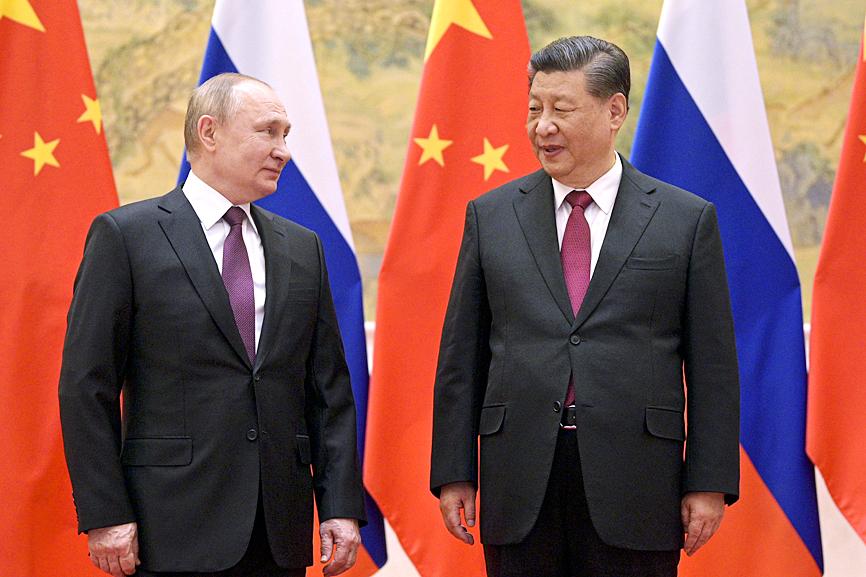China so far does not appear to be helping Russia evade Western financial sanctions on Moscow over its invasion of Ukraine, but doing so would “do profound damage” to China’s reputation, a senior official from the administration of US President Joe Biden said on Saturday.
“The latest signs suggest that China’s not coming to the rescue,” the official told reporters after announcing that the US and its allies agreed to impose sanctions against Russia’s central bank and disconnect key Russian banks from the SWIFT international financial transaction network.
Reports that some Chinese banks have stopped issuing letters of credit for purchases of physical commodities from Russia were a positive sign, the official said.

Photo: AP
This “suggests that, much like has been the pattern for years and years, China has tended to respect the force of US sanctions,” the official added.
China is Russia’s biggest trade partner for both exports and imports, buying one-third of Russia’s crude oil exports in 2020 and supplying it with manufactured products from cellphones and computers to toys and clothing.
Some of that trade is conducted in China’s yuan currency, which could technically fall outside of sanctions aimed at cutting Russia off from transactions in US dollars, euros, sterling and other major currencies.
However, Chinese banks that do business with Russian banks and other entities hit with full blocking sanctions and put on the US Department of the Treasury’s “specially designated nationals” list could face sanctions themselves and loss of access to the US financial system.
The official said that if China were to help Russia evade US sanctions, “it really would be an unfortunate signal for China’s vision of the world,” and give “tacit or explicit accommodation to Russia’s invasion of a sovereign country in the heart of Europe.”
“It would do profound damage to its reputation in Europe, but really across the world,” the official said of China.

Intelligence agents have recorded 510,000 instances of “controversial information” being spread online by the Chinese Communist Party (CCP) so far this year, the National Security Bureau (NSB) said in a report yesterday, as it warned of artificial intelligence (AI) being employed to generate destabilizing misinformation. The bureau submitted a written report to the Legislative Yuan in preparation for National Security Bureau Director-General Tsai Ming-yen’s (蔡明彥) appearance before the Foreign Affairs and National Defense Committee today. The CCP has been using cognitive warfare to divide Taiwanese society by commenting on controversial issues such as Taiwan Semiconductor Manufacturing Co’s (TSMC, 台積電) investments in the

INVESTIGATION: The case is the latest instance of a DPP figure being implicated in an espionage network accused of allegedly leaking information to Chinese intelligence Democratic Progressive Party (DPP) member Ho Jen-chieh (何仁傑) was detained and held incommunicado yesterday on suspicion of spying for China during his tenure as assistant to then-minister of foreign affairs Joseph Wu (吳釗燮). The Taipei District Prosecutors’ Office said Ho was implicated during its investigation into alleged spying activities by former Presidential Office consultant Wu Shang-yu (吳尚雨). Prosecutors said there is reason to believe Ho breached the National Security Act (國家安全法) by leaking classified Ministry of Foreign Affairs information to Chinese intelligence. Following interrogation, prosecutors petitioned the Taipei District Court to detain Ho, citing concerns over potential collusion or tampering of evidence. The

‘COMPREHENSIVE PLAN’: Lin Chia-lung said that the government was ready to talk about a variety of issues, including investment in and purchases from the US The National Stabilization Fund (NSF) yesterday announced that it would step in to staunch stock market losses for the ninth time in the nation’s history. An NSF board meeting, originally scheduled for Monday next week, was moved to yesterday after stocks plummeted in the wake of US President Donald Trump’s announcement of 32 percent tariffs on Taiwan on Wednesday last week. Board members voted to support the stock market with the NT$500 billion (US$15.15 billion) fund, with injections of funds to begin as soon as today. The NSF in 2000 injected NT$120 billion to stabilize stocks, the most ever. The lowest amount it

NEGOTIATIONS: Taiwan has good relations with Washington and the outlook for the negotiations looks promising, Minister of Economic Affairs J.W. Kuo said Taiwan’s GDP growth this year is expected to decrease by 0.43 to 1.61 percentage points due to the effects of US tariffs, National Development Council (NDC) Minister Paul Liu (劉鏡清) said at a meeting of the legislature’s Economics Committee in Taipei yesterday, citing a preliminary estimate by a private research institution. Taiwan’s economy would be significantly affected by the 32 percent “reciprocal” tariffs slapped by the US, which took effect yesterday, Liu said, adding that GDP growth could fall below 3 percent and potentially even dip below 2 percent to 1.53 percent this year. The council has commissioned another institution